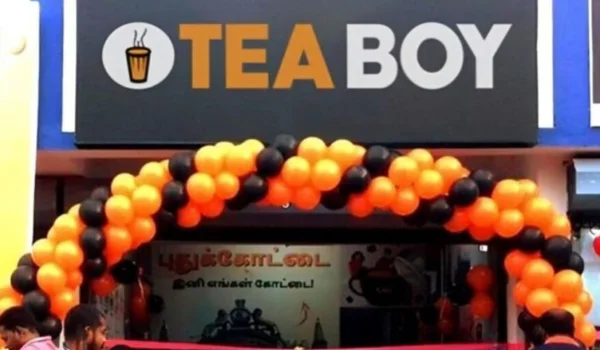Tea Boy—also known as Black Pekoe / TeaBoy—is one of India’s fastest-expanding tea brands. Launched in Chennai in 2017, it has swiftly grown to 550+ units across 25+ cities (and now reportedly over 1,150 outlets by mid-2024) offering a contemporary, hygienic tea experience in compact kiosks and carts.
The brand leverages minimal setup, uniform taste, and aggressive branding to target busy high-footfall zones like malls, transit hubs, corporate areas, and local markets. Tea Boy markets itself as an affordable, profitable business that offers low capital entry and high returns—making it attractive for small entrepreneurs, including working professionals and women entrepreneurs.
💰 Investment & Cost Overview
📊 Franchise Investment Snapshot
| Expense Category | Estimate (₹ lakh) |
| Franchise Fee | 0.50 |
| Infrastructure & Setup | 1.0–2.0 |
| Equipment (tea machines, POS etc.) | 0.50 |
| Initial Inventory & Disposables | 0.30–0.60 |
| Working Capital | 0.50 |
| Total Estimated Investment | ₹2.5–4.2 lakh |
| Royalty Fee | None |
| Franchise Contract Term | 5–10 years |
| Projected Monthly Profit | ₹40,000–1,00,000+ |
| Payback / ROI | 4–12 months (brand says <6 mo) |
- Total one‑time investment reported between ₹2.49 lakh (best franchise connect) to ₹4.19 lakh (Teaboy portal), covering franchise fee, infrastructure, equipment, inventory, and working capital.
- Franchise fees are approximately ₹50,000; setup and infrastructure ₹1–2 lakh; equipment around ₹50K; inventory ₹30–60K; working capital ₹50K. No ongoing royalties are charged.
📈 Financial Performance: Profit, ROI & Margins
- According to brand sources, franchisees can earn up to ₹1.8 lakh/month, with ROI under 6 months for some locations.
- Best Franchise Connect estimates net profit margins of 30–50%, with likely payback periods of 12–18 months, and typical earnings between ₹40K–₹1 lakh/month based on location and operations.
- Reddit industry commentary reinforces the profitability of stand-alone tea stalls—successful units in high-footfall zones can do very healthy turnover—even over ₹1 lakh/month—but margins after expenses are realistic at ~30–40%.
🏗 Franchise Model & Brand Support

Format: Unit Franchise (Kiosk/Cart)
- Tea Boy operates small kiosks or tea carts typically sized 100–200 sq.ft, located in malls, markets, office complexes, transit corridors, and dense localities.
- Franchise model is Franchise Owned, Franchise Operated (FOFO). Ownership and day-to-day operations are managed by you; the brand supplies a standard outlet kit, recipes, training, branding, and marketing support.
Brand Support Includes:
- Site layout and design guidance for streamlined display and efficient operations
- Product training covering recipes, hygiene protocols, service standards
- Marketing support: provision of branded materials, POS, local visibility strategies
- Lifetime operational support including training refreshers and supply guidance
✅ Eligibility & Ideal Franchisee Profile
To qualify, you should have:
- Minimum window/display area of 100–200 sq.ft in a high footfall location like malls, bus zones, corporate areas, or colleges.
- Startup capital ₹2.5–4.2 lakh inclusive of all initial expenses.
- Required licenses: FSSAI food license, GST registration, trade license from local municipality.
- Staffing: Typically needs 2 staff members (franchisee plus helper) to operate shifts efficiently, with operations as early as 5 am to late night depending on demand.
- Entrepreneurial aptitude: No prior F&B experience required—brand training covers the essentials—but discipline, hygiene, and people management are important.
- Franchise agreement generally ranges 5–10 years, renewable based on performance and location viability.
📝 How to Apply: Step‑by‑Step Process
- Visit official Tea Boy franchise portal and fill out the inquiry form with location and contact details.
- Initial screening call to assess suitability of proposed area, investment readiness, and operating interest.
- Site visit by brand representatives to evaluate footfall potential and logistics.
- Franchise agreement & fee payment: Pay initial ₹50K franchise fee (plus GST).
- Outlet fit-out & equipment: Complete layout as per Teaboy brand kit, install teas prep equipment, counters, digital POS.
- Staff training: Up to 3-day induction on tea brewing, service, hygiene, and billing.
- Soft launch & operational ramp-up: Start sales, use local promotions/materials provided, gather first customer feedback.
- Ongoing support: Access to brand hotline/contact for operations, supply restocking advice, marketing refreshers.
⚖️ Advantages & Risks
✅ Advantages
- Very low initial investment (~₹2.5–4 lakh) compared to larger cafés or QSR models.
- No ongoing royalties; high profit margins (30–50%) possible in strong locations.
- Fast ROI—Teaboy claims payback within 4–6 months; even conservative cases break even under a year.
- Scalable model: many franchisees eventually run multiple kiosks or territory units.
- Strong brand footprint in South India coupled with advisory and marketing support.
❌ Risks & Considerations
- Location sensitivity: Traffic matters—poor site selection can stall sales.
- Market saturation & authenticity: Reddit users caution about dozens of similar tea outlets and franchises flooding the market; discerning consumers favor quality and experience over branding alone.
- Operational overheads: Staffing, shift management, and daily operations need discipline; recommerce often undervalues these pitfalls.
- Franchise fee lock-in: Some reports (not necessarily Teaboy) suggest franchisees getting locked in or struggling to exit early, with limited refund or territory release options. Always clarify exit rights.
- Competition from street vendors: Informal chai stalls enjoy ultra-low costs; yet branded franchise may appear high-cost to some consumers unless quality is consistent.
💡 Expert Tips Before Investing
- Visit multiple existing Teaboy outlets in different localities to observe setup, sales, cleanliness, peak-hours footfall, menu variety, staff behavior.
- Talk to current franchisees, if possible, about actual monthly sales vs promises, supply reliability, franchisee support, and challenges faced.
- Calculate rent impact carefully: For a small 150 sq.ft kiosk, rent may become 20–30% of revenue—opt for a shared corner if rents are steep.
- Maintain a financial buffer of 3–6 months overhead beyond investment to navigate initial slow ramp-up or seasonality.
- Clarify contract terms: royalty free is good, but understand exclusivity, brand usage rights, renewal terms, minimum sales clauses, and exit penalties.
- Plan operations schedule in sync with local footfall—morning commuters, school hours, office shifts, etc. Align staffing and supply accordingly.
- Local marketing touchpoints such as partnering with delivery apps, flyer distribution, discounts for repeat customers, can speed momentum.
🧾 Quick Franchise Summary
- Total Investment: ₹2.5–4.2 lakh
- Space Required: 100–200 sq.ft kiosk/corner
- Franchise Fee: ₹0.5 lakh (one-time)
- Royalty: None
- Expected Monthly Profit: ₹40,000–1,00,000+
- ROI / Payback: 4–12 months (brand claims <6 mo average)
- Agreement Term: 5–10 years
- Staff Requirement: 2–3 persons
- Ideal For: Entrepreneurs seeking low-capital, quick-start small business in beverage retail with brand support and scalability potential
🎯 Final Take
The Tea Boy (Teaboy / Black Pekoe) franchise is positioned as an accessible and affordable beverage franchise for first-time entrepreneurs. With ultra-low investment, minimal setup, and the potential for fast returns, it can be a profitable entry into India’s booming quick-serve beverage space. However, success critically depends on location selection, operational discipline, and consistency in product quality.
While margins can be generous, competition is stiff—brands and unbranded stalls alike—and many operators emphasize that customer experience matters more than signage. Make sure to verify terms, visit existing outlets, and plan for local marketing.

Shashi Kant is the Founder and Editor of BusinessScroller.com, a leading platform for business insights, finance trends, and industry analysis. With a passion for journalism and expertise in business reporting, he curates well-researched content on market strategies, startups, and corporate success stories. His vision is to provide valuable information that empowers entrepreneurs and professionals. Under his leadership, BusinessScroller.com has grown into a trusted source for in-depth articles, customer care guides, and financial expertise.


